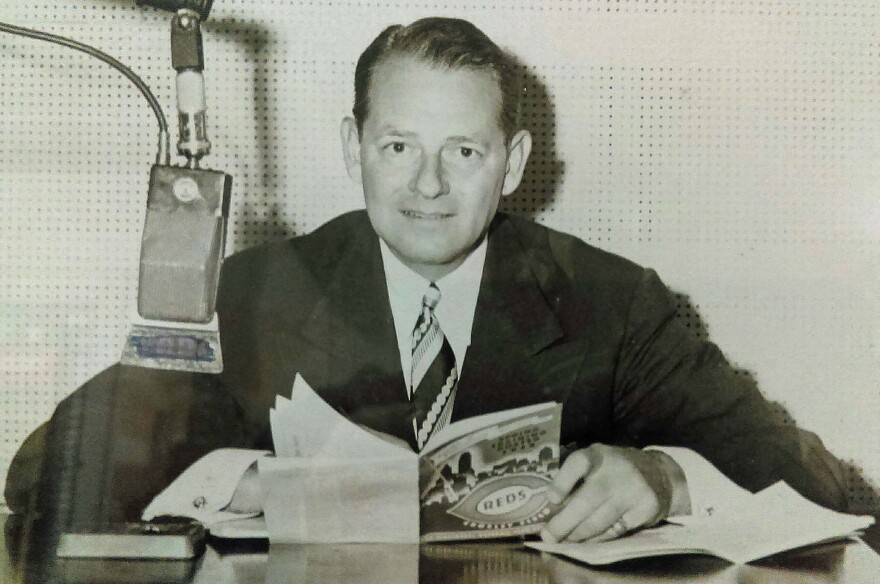Reds broadcaster Waite Hoyt, who was elected to the Baseball Hall of Fame as a player in 1969, is among eight finalists for the 2019 Ford C. Frick Award for baseball broadcasting excellence.
Hoyt, a former Yankees pitcher, was the Reds voice from 1942 through 1965, when Burger Beer lost the radio rights.
Al Helfer, who did Reds games 1935-37 with Red Barber, also was among the eight nominees for the Frick Award's "Broadcasting Beginnings" cycle honoring "early team voices and pioneers of baseball broadcasting." The Frick Award three-year cycle rotates yearly with "Current Major League Markets" (team-specific announcers) and "National Voices" (broadcasters whose contributions were realized on a national level).
Also nominated were Connie Desmond (Yankees, Dodgers, Giants); Pat Flanagan (Cubs and White Sox); Jack Graney (Indians); Harry Heilmann (Tigers); Rosey Rowswell (Pirates); and Ty Tyson (Tigers). All are deceased.
The winner will be announced Dec. 12 during the baseball winter meetings, and honored Saturday, July 20, during the Baseball Hall of Fame induction weekend in Cooperstown, NY.
Voters include the 11 living Frick Award recipients: Marty Brennaman; Bob Costas; Jaime Jarrin; Tony Kubek; Denny Matthews; Tim McCarver; Jon Miller; Eric Nadel; Vin Scully; Bob Uecker; and Dave Van Horne. Also on the panel are historians Curt Smith, David J. Halberstam and Ted Patterson, as well as Barry Horn from the the Dallas Morning News.
Hoyt, who died in 1984 at age 84, was one of the first players to enjoy a second career in the broadcast booth. He did Reds games for 24 years on WKRC-AM (550), WSAI-AM (1360) or old WCPO-AM (1230). Hoyt was known for filling rain delays with stories from his playing days, many involving Yankees teammate Babe Ruth, which were released on two record albums.
Hoyt compiled a 237-182 record pitching 21 seasons for the Yankees, Pirates, Dodgers, Tigers, Giants, Boston Red Sox and Philadelphia Athletics. He pitched in seven World Series, six with the 1920's Yankees, and one with the 1931 Athletics.
Helfer, a Pennsylvania native, came to Cincinnati after doing re-creations of Pittsburgh Pirates games. In 23 seasons, he also called games for the Brooklyn Dodgers, New York Giants, Phillies, Houston Colt 45s and Oakland Athletics. He broadcast 14 no-hitters, from Johnny Vander Meer's second consecutive no-hitter for the Reds against the Dodgers in 1938 to Catfish Hunter’s perfect game for Oakland in 1968. He earned the nickname "Mr. Radio Baseball" for doing Mutual Broadcasting's Game of the Day for five years in the 1950s.
Full bios are on the Hall of Fame website. Here's a quick look at the other six finalists:
Connie Desmond got his start in Ohio calling games for the Toledo Mud Hens and Columbus Red Birds before going to New York in 1942. He did Dodgers games with Red Barber, Vin Scully and Ernie Harwell, and Yankees and Giants games with Mel Allen.
Pat Flanagan was one of the first to re-create road games from a Western Union telegraph ticker. He broadcast the first All-Star game from Chicago's Comiskey Park in 1933.
Former Indians outfielder Jack Graney was "the first player to make successful transition from the field to the broadcast booth," the Hall of Fame says. After 14 seasons in uniform (1908; 1910-1922), he did Indians games for 21 years.
Like Hoyt, Harry Heilmann was elected to the Hall of Fame as a player for his 17-year career mostly with Detroit (1914; 1916-29), although he finished with the Reds (1930 and 1932). After retiring with a .342 lifetime batting average, he spent 17 years as the voice of the Tigers on radio and the early days of television.
Rosey Rowswell, the hugely popular Pittsburgh announcer for 19 seasons, was best known for his signature home run call: "Raise the window, Aunt Minnie, here she comes!"
Ty Tyson started doing Tigers games in 1927 from the stands, before broadcast booths were common in the Major Leagues. He called Tigers games for 16 years until replaced by Heilmann, and then did TV games for six years starting in 1947.
Copyright 2021 91.7 WVXU. To see more, visit . 9(MDA5NTM4MTIyMDE0MTg3NDc2MTVlZjdmNQ001))


